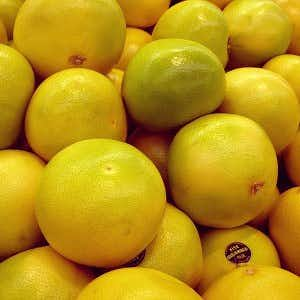
What do you know about the story on grapefruit juice and drug interactions? Some people have heard that it is risky to combine juice but not fruit with certain medications; others insist that the interaction holds for the fruit as well as the juice. Pharmacists may dispense wildly different advice regarding potential reactions with specific medications.
Will Grapefruit Interact with Blood Pressure Pills?
Q. My pharmacist told me that it was OK for my mother to eat grapefruit with her blood pressure meds but that she must NOT drink grapefruit juice. He said that pressing the grapefruit for juice releases some chemical from the skin that is the culprit in the drug interaction.
My mother lived to be 94, eating her daily grapefruit. I guess he was right.
What Is the Story on Grapefruit Juice Drug Interactions?
A. There is ongoing confusion about the grapefruit-drug interaction issue. The FDA disagrees with your pharmacist. So does the world’s leading expert on this interaction. When he first wrote about grapefruit juice interacting with medications, many health professionals were skeptical. Now, some tell patients not to eat grapefruit at all when they are taking certain prescription drugs.
Dr. David Bailey and his colleagues note that
“all forms of the fruit (freshly squeezed juice, frozen concentrate and whole fruit) have the potential to reduce the activity of CYP3A4” (CMAJ, March 5, 2013).
This enzyme (CYP3A4) helps break down many commonly prescribed medications within the digestive tract. If it is less active because of grapefruit, some drugs become more potent and more risky.
Not all blood pressure medicines are affected, though. People taking calcium channel blockers such as felodipine, nifedipine and verapamil should probably avoid grapefruit (Prescrire International, Dec. 2012). Most other BP drugs are not impacted by grapefruit. Perhaps your mother was taking an antihypertensive medication that was not altered by grapefruit.
Can You Safely Eat Grapefruit While Taking Simvastatin?
Q. I love grapefruit, the whole fruit. Years ago, I used to eat grapefruit often, but I have given it up. That is because I take simvastatin to lower my cholesterol.
I discussed my cravings with my heart doctor and we reached a happy medium. He says I can have half a grapefruit in the morning every five or six days. I take my pill in the evening, and he figures 12 hours or so is a safe time spread between medication and fruit.
Is Breakfast to Bedtime Enough Time?
A. Your doctor has it partially correct. Grapefruit contains compounds (furanocoumarins) that inhibit a crucial enzyme in the digestive tract that breaks down many medications, including simvastatin. This means more medicine circulates in the body, increasing the risk for side effects. The enzyme, called CYP3A4, is responsible for the metabolism of numerous medications in addition to simvastatin.
When grapefruit and simvastatin are taken together, blood levels of the drug increase by 260 percent (Lee, Morris & Wald, American Journal of Medicine, Jan. 2016). When taken 12 hours apart, as your doctor recommends, blood levels go up by 90 percent. Dr. Bailey suggests that it might be better to avoid grapefruit with certain statins such as simvastatin (American Journal of Medicine, Nov. 2016).
Enjoying grapefruit once or twice a week probably won’t have a lasting effect. Daily grapefruit, however, could cause trouble since the grapefruit effect lasts at least 24 hours. Just to complicate the situation, some people react far more strongly when they eat grapefruit than others do. We don’t yet have good ways to tell ahead of time who will get a very noticeable boost in blood levels from this interaction.
Do Other Fruit Juices Share the Story on Grapefruit Juice?
People often wonder if other fruit juices, especially citrus juices, have a similar effect to grapefruit juice. researchers have found that both clementine juice and to a lesser extent mandarin juice also inhibit CYP3A4 and could potentially interact with certain medications (European Journal of Pharmaceutical Sciences, Jan. 15, 2017). Seville orange juice and pomelo juice might also interact in a similar way, while orange juice does not (Journal of Food and Drug Analysis, April 2018).
Learn More:
To learn more about the interactions of grapefruit and other foods with medicines, you may wish to download our free Guides to Drug and Food Interactions and Grapefruit Interactions.


